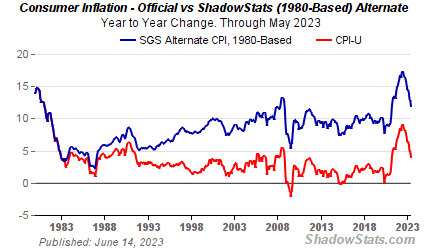The aliens and UFO report is 99.9% complete at this moment and should be available Wednesday around 1PM EST on Scribd and probably my main website too if there aren’t any major last minute issues that arise. Right now it’s going to be 25 pages in length and has a lot of information. I plan to post an announcement on my blog around 1PM EST Wednesday with the links to the research report.
Now onto something that’s been on my mind for the past week…
The fiscal situation in the United States is far worse than what the government presents to the public. There are two types of budget deficits figures released by the U.S. Government: one touted by Congress while the other one is a less publicized financial audit made by the Government Accountability Office (GAO). Congress’s numbers are the most flawed because they “don’t count the growing burden of future pensions and medical care for federal retirees and military personnel”.[1] This makes a major difference in the bottom line as you will see below.
Last week (after a two month delay) the audited report came out and showed that the government actually ran a $4.3 trillion deficit rather than just a $1.4 trillion deficit in 2009.[2] In addition, if the government used the same accounting system that publicly-traded companies use they would have reported that they have a $70.7 trillion GAAP negative net worth.[3]
The U.S.’s GAAP negative net worth may actually understate how bad the U.S.’s unfunded liability problem is. Some estimates have the U.S.’s unfunded liabilities above $100 trillion!
- For instance, the National Center of Policy Analysis found that the size of future liabilities is actually $106.8 Trillion http://www.ncpa.org/pub/ba662
To give you a sense of how staggering the U.S.’s unfunded liability problem is the world’s economy is just above $60 trillion. The U.S. essentially has unfunded liabilities that exceeds the economy of the world! The world could not help the U.S. completely cover its unfunded liabilities even if it sacrificed all of its economic output to help the U.S. cover it.
The problem is going to get worse because Barack Obama’s spending is adding more to the deficit each year even though he claims he’s trying to cut back on government spending. In fact, the Congressional Budget Office recently reported that the national debt would increase by $1.2 trillion more than what the White House projected by 2020 ($9.7 trillion vs. $8.5 trillion).
In the end, the U.S.’s debt problem is likely going to lead to much higher interest rates and most likely the collapse of the U.S. dollar. There is no way the U.S. could possibly make up these liabilities without resorting to money printing (cutting back on benefits is not a politically expedient option since it would lead to rioting and massive civil unrest like the kind experienced in Europe right now). Unfortunately, the U.S. is living on borrowed time and so is the current world order.
- You can read more about the economic end game for the U.S. (and world economy) in Prophecy Proof Insights of the Next World War
Every time I think about the horrible fiscal shape the U.S. is in I wonder who in their right mind would want to own a long-term U.S. government bond. People perceive U.S. government bonds as one of the safest “investments” in the world. However, this is a complete misconception… Does it make sense for you to loan a person your hard earned money for 10 or more years when that person already has debts that they cannot payback? Does it make sense for you to only receive a 3.625% interest rate (the current interest rate of a 10 year U.S. Government Bond) to take on this risk when the inflation rate is above 9% a year? (see the graph below). It doesn't to me…
[1] Cauchon, Dennis. What’s the Real Federal Deficit? 3 Aug. 2006. A01 USA Today http://www.usatoday.com/printedition/news/20060803/1a_coverart03.art_dom.htm
[2] Williams, John. “Federal Government 2009 GAAP-Accounting”. 1 Mar. 2010. Last Accessed. 9 Mar. 2010. http://www.shadowstats.com/
[3] Corsi, Jerome. “Looook How Many Zeroes in the Deficit Now!”. 8 Mar. 2010. Last Accessed 9 Mar. 2010. http://www.wnd.com/index.php?fa=PAGE.view&pageId=127360 .

